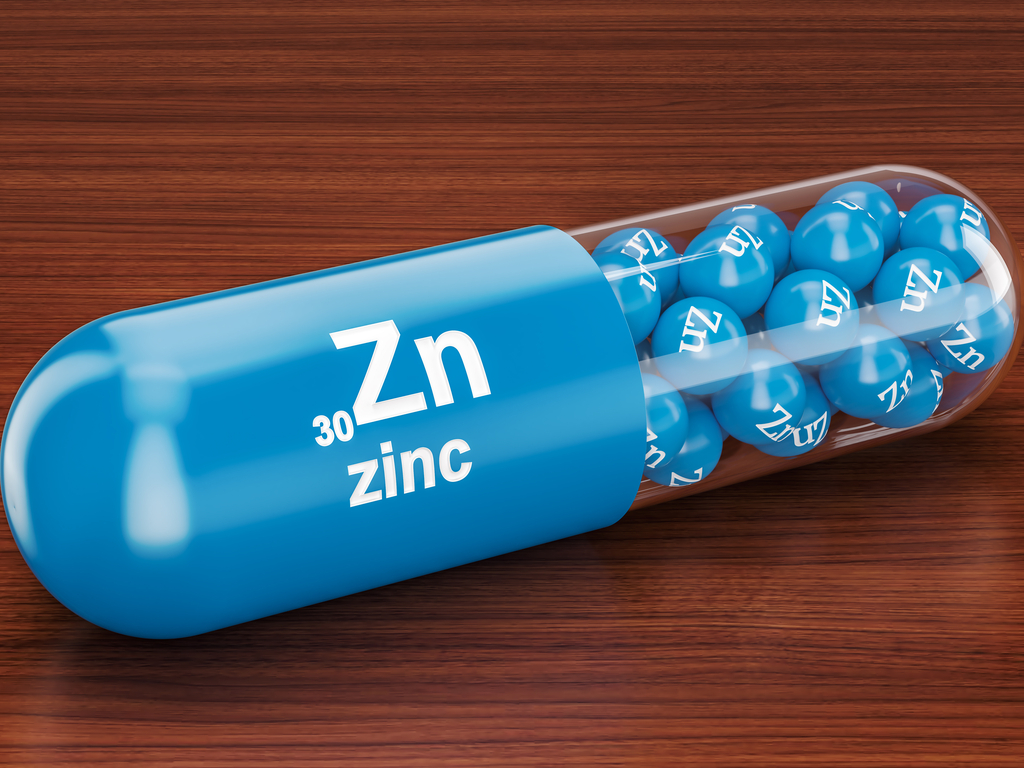From A to Zinc: Everything You Need to Know about Zinc Benefits and How to Get Enough Each Day
An essential mineral, zinc is vital for many body functions, ranging from cellular metabolism and growth to immune function and hormone production. We even need zinc to smell and taste properly. Your body does not make its own supply of zinc, so you need to get it from outside sources. It is naturally found in some foods, added to some others, and is available as a dietary supplement, in vitamins, and lozenges. There are many zinc benefits that you should be aware of. This post emphasizes why you need a sufficient amount of this critical mineral in your diet, and how to get enough each day.
Zinc Benefits: The Miracle Mineral
Some might consider zinc a multi-purpose mineral because our bodies use it for so many different functions. Keep reading to learn everything you need to know about zinc benefits!
Zinc and Your Immune System
One of zinc’s most important jobs is regulating the immune system. Even minor zinc deficiencies can suppress and alter immune function. When you are not getting the zinc you need, your white blood cells are unable to activate properly to control the spread of pathogens. This means that you are more susceptible to opportunistic infections.
The link between low blood levels of zinc and decreased immunity is so strong that some researchers have theorized that we might reduce the severity and length of the common cold by supplementing with zinc. According to their hypothesis, zinc can help reduce inflammation and prevent the rhinovirus from replicating inside the nose.
Zinc also plays a role in wound healing. Inadequate amounts of zinc can delay healing and leave you vulnerable to sores, wounds, and ulcers.
Zinc and Inflammation
The inflammatory response is a natural part of the immune system’s defense. When your body detects a pathogen or injury, it increases blood flow to the affected area. This triggers redness and warmth. Fluids can begin to leak, triggering swelling and irritating sensitive nerve tissues. The area is now inflamed.
This process is intended to heal, but out-of-control inflammation can damage rather than heal tissues. The inflamed tissues break down and are eventually destroyed.
Zinc helps moderate the immune response and prevents the kind of excessive inflammation that destroys healthy body tissues. According to research, inadequate zinc intake is linked to poor healing and increased susceptibility to infection. The body’s inflammatory processes are no longer helpful but become harmful.
If you have a zinc deficiency, upping your intake could help keep your body’s inflammatory processes balanced and healthy. Your body will respond with enough inflammation to destroy the pathogen or unhealthy tissues without becoming overly zealous and destroying healthy tissues in the process.
Zinc and Testosterone
Your immune system relies on zinc to function properly, and your body uses zinc to break down nutrients from the foods you eat. However, zinc has another important job to do: It helps maintain healthy hormone levels.
Hypogonadism occurs when the gonads, ovaries or testes, are failing to function properly. In men, this can lead to low testosterone levels. Men with low testosterone levels may experience:
- Hair loss
- Muscle loss
- Erectile dysfunction
- Low sex drive
- Fatigue
- Breast growth
- Hot flashes
- Difficulty concentrating
- Osteoporosis
Women can also experience hypogonadism, but theirs is typically associated with estrogen and progesterone rather than testosterone.
While zinc alone will not address hypogonadism that is due to underlying conditions, proper supplementation might help increase your testosterone levels. In one study, men who supplemented with zinc experienced higher levels of free testosterone.
Maintaining healthy testosterone levels can help you feel better and keep your body operating at its peak.
Zinc Deficiencies
What if I am not getting enough zinc?
While you can eat a well-balanced diet while practicing intermittent fasting and using any one of several ways of eating, you might still worry about your zinc intake. Zinc is a critical nutrient for many essential body functions, and not getting enough can lead to serious health problems.
Symptoms of a zinc deficiency can include:
- Skin lesions
- Weight loss
- Poor wound healing
- Lethargy
- Poor taste and lost appetite
- Diarrhea
- Impaired immune function
Because these symptoms can be associated with other health problems, your doctor may want to rule them out before recommending a zinc supplement. However, your risk of experiencing a zinc deficiency might be higher if you have:
- IBD
- Malabsorption syndrome
- Liver disease
- Kidney disease
- Sickle cell disease
- Diabetes
- Chronic diarrhea
You might also be at a high risk of a deficiency if you have had gastrointestinal surgery, misuse alcohol, are a vegan, or eat too few calories for your dietary needs. Pregnant and lactating women can also benefit from supplementation due to their increased needs.
Getting More Zinc in Your Diet
Many foods are good sources of zinc. Meat and poultry are some of the best sources of zinc, which is good news for those who follow carnivore, paleo, or keto ways of eating.
You can get more zinc into your diet with:
- Oysters
- Beef
- Lobster
- Pork
- Chicken
- Flounder or sole
You can also get zinc in your diet from non-animal sources, such as beans, nuts, whole grains, and fortified cereals. However, phytates in these foods can interfere with absorption and reduce bioavailability.
Beans, nuts, whole grains, dairy products, and fortified cereals can also be good sources of zinc. However, these also tend to contain phytates, which can interfere with absorption.
Using Zinc Supplements
If you are unable to get enough zinc to meet your body’s needs through diet alone, you might consider using a supplement. Zinc supplements are widely available in the form of lozenges, gummies, and multivitamins.
The Recommended Dietary Allowance can help you ensure you get the right amount of zinc to meet your needs.
Babies and toddlers generally need about 2 to 3 mg per day. Children between 4 and 8 years old need 5 mg per day. Children from 9 to 13 years need 8 mg per day and teens up to 18 need 9 to 11 mg per day. Pregnant and lactating women need between 11 and 13 mg per day, and adults over the age of 19 need between 8 and 11 mg a day.
Up to half of older adults might be getting less than half of the zinc they need to stay healthy.
According to surveys, most infants and children are meeting their body’s needs for zinc. However, older adults might not be. I personally recommend a higher daily intake of zinc, especially for men, but really for all adults, in order to keep your immune system, hormones, and body functioning properly. Between 15-30 mg per day of a good zinc supplement, in addition to whatever you are getting from your diet, is considered safe and optimal for most people. I’ve found that this is the best way to experience zinc benefits and to avoid a deficiency.
However, anything more than that amount, for an extended period of time like several months, can be a problem. More on that below…
Excessive Zinc
Is there such a thing as taking too much zinc?
As with most other minerals, you don’t want to get too much of a good thing with zinc. You can suffer from zinc toxicity if you take too much (more than 30 mg in a supplement) either in the short-term or the long-term. Symptoms of zinc toxicity can include:
- Abdominal cramps, nausea, diarrhea
- Headaches
- Altered iron function and low copper status
- Altered immune function
- Genitourinary problems
Zinc supplements can also interact with certain medications, including antibiotics and diuretics. It’s important to talk to your doctor or pharmacist about all the medicines and supplements you take to ensure you suffer no unwanted interactions.
A Final Word on Zinc Benefits
As with all nutrients, the best way to meet your body’s needs is by eating a nutrient-dense diet. Your meals should be rich in essential vitamins and minerals to nourish and replenish your stores and keep your essential functions operating as they should.
Whether you are eating one meal a day or on a less strict 18:6 eating plan, you need to incorporate a variety of protein foods to feed your muscles, plenty of healthy fats for energy and brain function, and fresh produce for your vitamins and fiber. Avoid empty calories and processed foods, and replenish your fluid level with plenty of fresh, filtered water as needed, but especially after a dry fast. Whether you are currently living a fasting-focused lifestyle or not, getting optimal amounts of this mineral is extremely important in order to experience all of the zinc benefits that can enhance your health and well-being.

